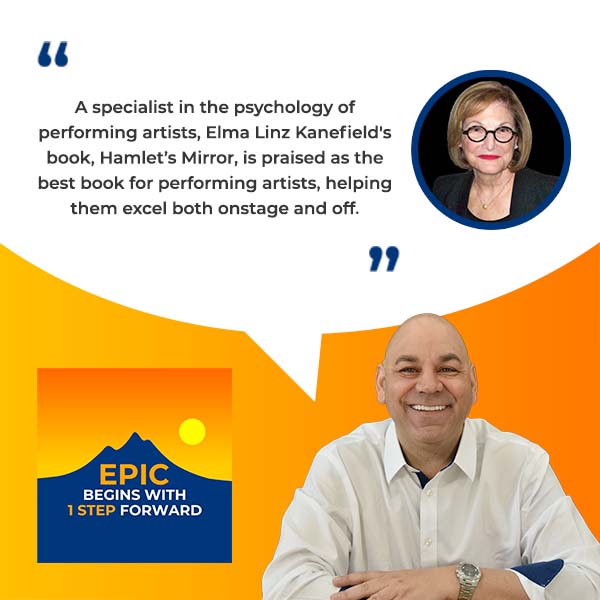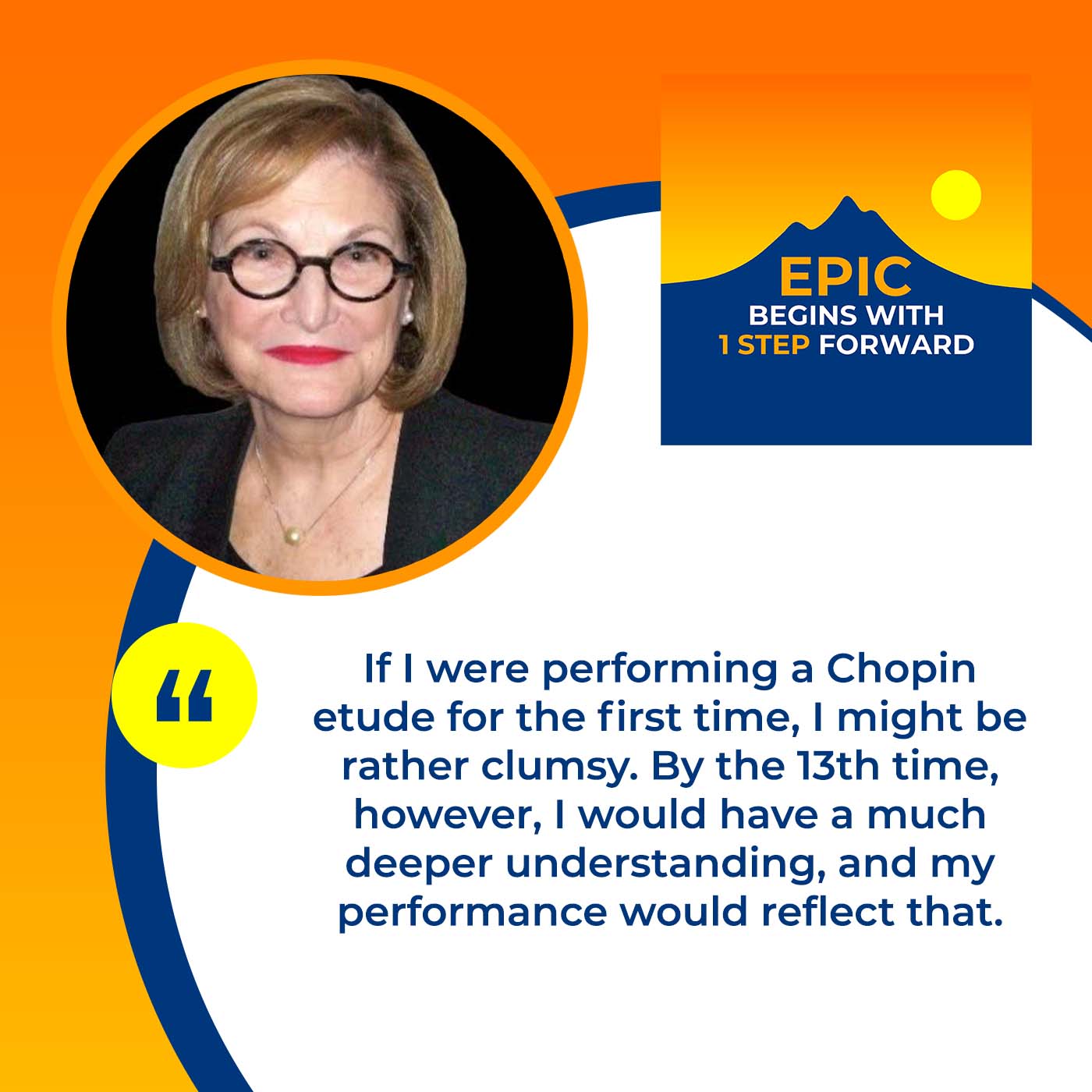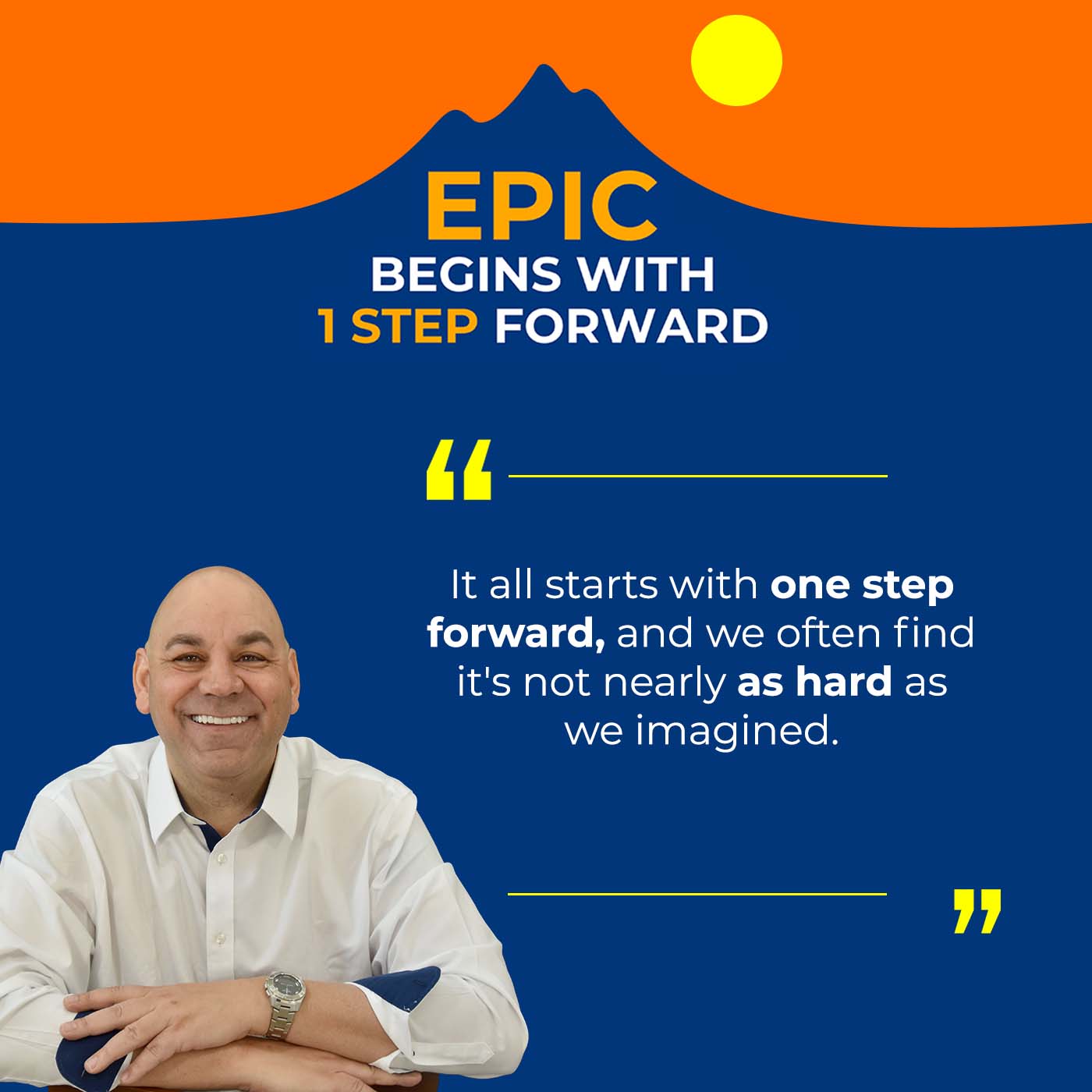In this episode of EPIC Begins With One Step Forward, host Zander Sprague welcomes the insightful Elma Linz Kanefield, a psychotherapist, life coach, and author dedicated to supporting performing artists. Recovering from a bout of asthma, Elma shares her journey in writing her book, Hamlet’s Mirror, which distills wisdom from her 40-year career into lessons for artists and anyone seeking to reach their performance potential. Through personal anecdotes and professional insights, Elma and Zander delve into the importance of staying present, embracing failure as part of the process, and the empowering mantra that changing your thoughts can transform your actions. Join them for an inspiring discussion on the pursuit of epic achievements and the resilience required to navigate the path to success.
—
Watch the episode here
Listen to the podcast here
Elevate Your Performance Potential To EPIC Heights With Elma Linz Kanefield
Introduction
I am so honored to be joined by Elma Linz Kanefield. Elma, tell us who you are and what you do.
I am Elma Linz Kanefield and it is a joy to be here with you, particularly because I’m recovering from a bout of asthma and I can speak. I am a Psychotherapist and a Life Coach and I work exclusively with performing artists. I’m also an author, which is an epic achievement for me. I wrote a book called Hamlet’s Mirror. It is a compilation of what I learned in the last 40 years from the artists with whom I’ve worked, what they’ve taught me, and I hope what they will teach you. As Hamlet says, “It is our artists, after all, who hold the mirror up to life.”
There are things that we share that are similar. I am a Licensed Professional Clinical Counselor. I, too, am a mental health provider. When you talked about how epic it is to have written a book, I couldn’t agree more. I’ve been lucky enough to write three books but if you’d ask me in college whether I’d write a book, I say absolutely not. Truth be told, I say I’m a talker, not a typer. The fact that I’ve written books blows my mind, honestly.
It’s epic.
Where to start? There’s so much. How did you get into being a psychotherapist in mental health?

I had my issues and a lot of them had to do with performing. In Hamlet’s Mirror, I developed the concept of performance potential. It’s about an epic feat reaching your performance potential that’s both internal and external. What performance potential to me, and I hope can be for others, is being and doing the best that you can, knowing what you know at the moment of performance.
In other words, if I was, say, a housewife, having a baby and changing a diaper for the first time, it might be rather scary. If I was doing it for the 20th time, piece of cake. If I were an artist performing a Chopin etude for the first time, I might be rather clumsy but for the 13th time, I would know more at the time of performance, at the time of doing and it would be different.

I can say that aside from being a motivational speaker and stuff, I spent nearly twenty years as a technical instructor. I taught people how to use software and that was a show. I do love being in front of an audience. I get what you mean where I always knew the first couple of times I was delivering a class. I didn’t worry about it. I knew from experience that there was stuff I was not going to remember.
As I got more familiar, what it allowed me to do is, sometimes, it was almost this out-of-body experience of I can see myself presenting, but I’m spending time looking at the audience or the students, seeing how they’re reacting, how I need to tweak this particular presentation to captivate them, and coming up with vignettes and stories to help make it memorable.
Knowing that you were reaching your performance potential at that moment, but at another moment, you’d know more and you’d reach another performance potential.
It’s true. When I was growing up, I did some plays in elementary school and high school and stuff. I remember when I had bigger roles. “I forgot that line.” What I was told by my drama teacher is unless it’s a famous play and flubs up a line, the only people who know are the actors. No one else is going to know. The same way that when I’m giving a speech or you’re doing something, no one knows that you messed up, but you.
One of the important things about epic moments and performance potential is thinking. In Hamlet’s Mirror, I developed a mantra that I love to dance to, and it goes, “When you change what you’re thinking, you will change what you’re doing.” Unless you stay in the moment of performance, right now and you don’t think of the outcome, you lose that motivation, you lose that love of what you’re doing. You loved what you were doing. You love what you’re doing now. If you were thinking, “I’ve got to make this good,” you wouldn’t be with yourself and that’s so important to stay in the moment, not think of results.
When you change what you’re thinking, you will change what you’re doing.
Certainly, when we are on our epic journeys, whatever that may be, for me, epic, the letters EPIC stand for Every Pilgrimage Includes Commitment. When we’re trying to achieve something big in our life, it is a pilgrimage. You’re going towards something that has significance to you.
Yes. Moment by moment.
Moment by moment, the only way that you can do it. It’s great to say, I know where I want to end up. I know what my goal is, but you can’t get there unless you’re doing each of the steps that need to happen.
Hamlet’s Mirror took me 30 years to write.
Congratulations. I know what an achievement it is. I don’t know about you, but I know that the writing of the book was very challenging but equally as challenging was the whole editing and proofreading process. On each of my books, by the time it came out, I had fully read my book at least 6, if not 10 times.
I didn’t want to be reading my book for a while because I had spent a month rereading everything I wrote and also being a little critical of, “Do I really want to say it that way?” I think there is that whole thing in a performance of writing a book of being, “Good enough.” At some point with your book, you have to say, “I am happy enough with the way it is.” In a performance, we can always be sometimes the meanest person in our life is ourselves.
I think you identified such an important word in epic and performance potential living, which is, “Enough.”
Yes and it’s funny, I talk about that when I’m working with my clients. I say, “That may be good enough.” They will answer, “But it’s not perfection.” I respond, “You’re not going to get that.” Oftentimes, it’s other people who love what you’ve done. They love your performance and they come up and they tell you how much they liked it. Sadly, in our mind, “I missed this line. I didn’t do this. I didn’t do that.”
I know I honestly didn’t see myself as an author. I wrote my first book and sat on it for five years because I didn’t believe in my book. My first book was about sibling loss. I didn’t see myself as a writer. I kept telling people I was coming out with a book. “Yes, I’m coming out with a book.” The truth was I was no more coming out with a book than I was about to fly to the moon. I don’t want to be that person who says, “I’m doing something and not trying.”
It’s fine if you’re trying to do it and it’s taking longer than you believe it was going to take you. I finally put out the book and I had that Imposter Syndrome, Elma, where people came up and told me that they liked my book. In my mind, honestly, for about nine months or a year, I think, “?” If they had told me that it wasn’t worth the paper it was printed on, I would have believed that more than the fact that people were enjoying my book and found value in it.
What made you know that you wrote something of value?
I wrote this book for my fellow sibling survivors. My book is about sibling loss. I guess when you hear a message enough and different people tell you that they liked something, you’ve got to start to believe it because there’s so much positive evidence outside, to use a bit of cognitive behavioral therapy there. When I thought that it was not worth it or whatever, I asked myself, “What proof do I have that is true?” There wasn’t, but there was so much proof that there was value.
Outside. I would hazard a guess that your epic moment, you credit outside, but you had an epic moment inside where you began to trust yourself.
I’ve been fortunate in my life to do many incredibly epic things that I didn’t think were possible but I haven’t let that stop me just because I don’t know how to do something. I perhaps have an overblown sense of belief in myself, but I do think it helps me greatly because I’ve been hired for jobs that I had no right to be hired for, like technical jobs. I look back and ask myself, “How did they ever hire me?” It’s probably because there is something to be said about self-confidence, that, “Fake it until you make it,” kind of thing.
Maybe you have a core belief, a trust in yourself, in your performance potential. You stay with yourself.
Yes, and I know what I want.
Yes, knowing what you want and what you need is such a crucial part of epic moments moving forward. They’re so parallel and have performance potential. I learned that. The performers I worked with taught me that so vividly. That’s for anybody. May I share two personal stories? I wrote a book. Spell-check doesn’t even get me.
Knowing what you want and what you need is such a crucial part of epic moments moving forward.
I’m right there with you, trust me.
I started psychological service. I had this amazing opportunity to start psychological services at the Juilliard School. They trusted me without any administrative background and it’s still going and it serves the school so amazingly. They were so fearless in trusting me.
Hamlet’s Mirror
I was going to ask you about working at Juilliard and that’s awesome. Here’s a question I have for you. You said it took you 30 years to write Hamlet’s Miracle.
Yes. With that spelling.
I know. Trust me. I’m a talker, not a typer. What I figured out to write my book was I dictated and then I had something to work with. No one says you have to sit down and type in a keyboard. I remember growing up that I was horrible at spelling and my mom always said, “What are you going to do? You need to know how to spell.” I said, “I’m going to have someone to do it for me.” Word processing came along and all of that.
I also absolutely get that sometimes, even spell check can’t figure out what word we’re trying to do. I remember my mom said, “You have a dictionary. Look it up.” I said, “Mom, if I don’t even know how to start to spell the word, a dictionary isn’t going to help me.” Enough about me for a moment. I’m interested, when your book came out, what was that moment for you? All of a sudden, your book is out and you’re telling people. Thirty years is a very long time to work on a project.
It still is. First of all, do you know how families are divided into roles? My sister is a beautiful writer. She’s exquisite. She’s the writer. I have help from a wonderful colleague. It’s still amazing to me. What’s most amazing is that I learn from the book all the time. I practice the book.
The stuff I wrote in Epic Begins with 1 Step Forward came from what I have done and what I continue to do, what I need to remind myself. Failure is part of the process. I am going to try stuff and it’s not going to work in a variety of things. In this age of wonderful technology, I have spent, sadly but it is the way it is, probably thousands of dollars on different programs to help me do different aspects of my job.
Those tools didn’t work for me. It’s not that they were bad. They just weren’t the right tools for me. In the same way that if we are cooking, we try a certain type of pan, iron-clad or Teflon or whatever. If that pan doesn’t work for you, it doesn’t mean it’s a bad pan. It’s just not the one for you. You learn how not to do something.
You learn what doesn’t work, so you turn to something that works.
The only thing that we will fail at are the things that we don’t try. I believe that for so many people, they have epic dreams. Those things that we say, “I’d love to write a book. I’d like to run a marathon. I’d to travel someplace.” My question is, so why aren’t you?
What’s stopping you?
Yes. Why can’t you do it? The funny thing is, it does begin with one step forward. What we discover is, that step is not nearly as hard as we imagine. I work with lots of people who have their stuff that they want to do. They say, “I don’t know the whole path.” I remind them, “When you got up this morning, did you have all the answers to all the questions that you were going to get today?” They said, “No.” I replied, “Why did you get out of bed?” You didn’t know everything and you didn’t have everything. I don’t understand. If you didn’t have the answers for everything that you were going to get asked, why is your epic dream any different?

Yes, that’s great. You break it down into something so manageable. A day. You didn’t know your breakfast wasn’t ready.
We don’t know what’s going to happen. There are things that we know are going to happen during our day. You and I had this awesome interview, but neither one of us knew where this conversation was going to go. It didn’t stop us from going, “I know every question you’re going to ask Zander and I have prepared any answer,” then what? You show up. You work with performers at Juilliard and outside Juilliard, every time they perform, it’s different. If they’re in TV or film and they’re doing a take, every take is slightly different. It can’t help but be.
It’s because the moment’s different. That’s performance potential because the knowing is different. They are different. Their thinking is different. Their feeling is different.
One of the things that I love to ask my guests is, two words that I think are important and should be your passenger in your life is, “Not yet.” “Has your book come out?” “Not yet.” You say no. It’s such a hard stop but as we both know, getting the book printed, it’s a, “Not yet. I’m still editing. It’s taking longer.” It means that it is going to happen. What’s one or two of your not yet?
I’m a great-grandmother three times. I have three great-granddaughters. I mean that in a great sense. I haven’t been able to help my granddaughter who lives in Massachusetts as much as I want to. That’s one of my, “Not yet”.
How about a TEDx Talk?
Yes. Thank you. I’d love to. What’s stopping me?
I do want to. I’m all ready to do a TEDx Talk. I’ve got the subject. I have to find the TEDx meeting. I discovered amazing things. Go to the Ted Talk website and they have the TEDx, but for some reason, you could see where they’re organized, but they don’t make them put contact info. There’s no way that, as a speaker, you could say, “What’s the process to see if I could come to talk at this event?”
Thank you. I would love to do that.
There’s a big, “Not yet.” It doesn’t mean that it’s not going to happen. I also talk about the not yets that may never happen, but we still hold open the possibility.
It is because anything’s possible. That’s a way of thinking that keeps our epic step forward, and our performance potential vibrant.
It is because you’re working with performers, they have to have that. They have to have the not yet mindset or the performance potential mindset because there’s so much rejection that goes on, especially if you’re inactive. Also, if you’re a musician, you’re auditioning for stuff. It’s devastating.
It does not have to be. First of all, one of the ways of thinking is to learn not to take it personally. That’s for anyone because people are separate. People could think of my dumbbell because I don’t spell. If I took that personally.
It’s a mind over matter. If you don’t mind, it doesn’t matter. However, for people to say, “I want to get cast in a regular TV series or a movie,” it may take a long time. They may get a lot of rejection.
It depends on how you feel your feelings. Feelings are wonderful resources. They inform you how you act or don’t act on them. In Hamlet’s Mirror, I do a whole section on feelings because we’re taught to think in school. We’re not taught to feel. Feelings are very misunderstood, misinterpreted, and abused. It’s part of our wonderful human resources, I think.
Wrap-Up
Elma, can you believe that here we are, we’ve been having so much fun, but our time is sadly up. How did this happen? We’ve gone on an epic journey of exploration of your fabulous book. My question is, how can people find your book?
They can find it on Amazon. They can go to a bookstore and order it.
From time to time, you might go to Amazon and say, “Let me see how my book is doing. Look at that. People have reviewed it and liked it.” Imagine that. I want to thank you so much for joining us. It has truly been epic.
Thank you. It’s been joyful, it’s been learning, it’s been fun, and I’m so happy that we did it. Thank you.
To everyone else, I want to remind you that if you go to EpicBegins.com, you find all the resources for you to start your epic journey. As always, epic choices lead to the epic life that you want.

